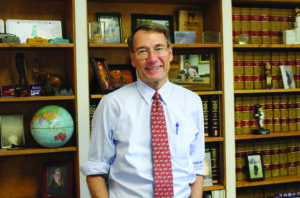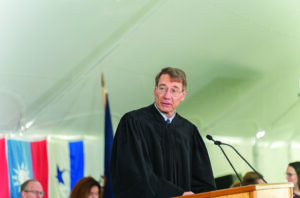By Tom Jarvis

New Hampshire Supreme Court (NHSC) Senior Associate Justice James P. Bassett retired from the bench on August 31 after 13 years of service.
He participated fully through his retirement date, though he last sat for oral arguments in March. He also served as liaison to the New Hampshire Bar Association Board of Governors, a role he assumed after Justice Gary Hicks retired in November 2023.
“It has been an honor and my great privilege to serve as a Justice on the Supreme Court since 2012,” he wrote in his retirement letter to Governor Kelly Ayotte. “During the past 13 years, I have endeavored to serve the citizens of New Hampshire with diligence and humility. I will miss working with fellow Justices and colleagues on the Supreme Court, and all of the dedicated members of the Judicial Branch.”
Before the Bench
Justice Bassett grew up in Fairfield, Connecticut, and spent summers working at his uncle’s farm in North Pomfret, Vermont. He graduated from Dartmouth College in 1978, earned his JD from the University of Virginia School of Law in 1982, clerked for Chief Judge Andrew Caffrey of the US District Court for Massachusetts, and practiced at Hale and Dorr in Boston before joining Orr & Reno in 1985.
He practiced law in Concord for 27 years, most of that time at Orr & Reno, where he maintained an active trial and appellate docket in state and federal courts and frequently presented oral arguments before the NHSC.
Among the memorable cases he highlights is the WMUR case in the early 2000s, in which he represented the New York Times, the Boston Globe, and WMUR. In that case, the NHSC established a presumption of courtroom access for photographers and television cameras.
Attorney William Chapman, who practiced with Justice Bassett at Orr & Reno for decades, recalls his first impressions.
“He interviewed with the firm on November 12, 1984,” says Chapman. “He impressed all of us, and we knew right away we wanted to hire him. When he joined us in the summer of 1985, he impressed everybody with his work ethic, his friendliness, his varied interests. He’s an incredibly well-rounded person.”
Chapman adds that early constitutional matters Bassett handled showed “the dedication and intellectual capability to go on and become a justice of the Supreme Court.”
Justice Bassett’s civic involvement predated his judicial service. For more than two decades he served in local government in Canterbury, including on the planning board – where he was chair for many years – and on the board of selectmen. He also volunteered with statewide organizations, including New Hampshire Public Radio, the Capitol Center for the Arts, and United Way.
Path to the Court and Judicial Approach
Justice Bassett joined the NHSC directly from private practice. He was sworn in on July 19, 2012, after being nominated by then-Governor John Lynch. He notes that when he arrived in 2012, his colleagues had vast experience as trial judges.
“One of my pitches to the governor was that it’s important to have the perspective of a trial lawyer – someone who had tried a lot of cases, argued cases here, and understood client dynamics in a way you don’t experience as a judge,” he says. “Ultimately, I think it’s very valuable to have a balance between former trial judges and practitioners on this Court. Both perspectives are important.”
Asked to describe his judicial philosophy, Justice Bassett says he favored a restrained, case-specific mode of decision-making.
“My philosophy is pragmatic but guided by institutional and constitutional constraints, and mindful of the limited role we have of construing statutes and interpreting the Constitution,” he says. “I try to write narrow decisions. That’s really the preferred approach for any court – not to reach for issues or write more broadly than you need to.”
He also stresses open-minded deliberation.
“The biggest mistake you can make as a judge is to be certain of your views or harbor no self-doubt,” he says. “We owe it to the people of the state to constantly question how we’re approaching problems. It’s a five-person court for a reason – five different perspectives. You go into a case with a view, but you need to listen carefully to your colleagues and be willing to re-examine your views.”
Work on the Court
During his tenure, Justice Bassett authored opinions across the Court’s civil and criminal docket and participated in several high-profile matters. He notes the Court’s repeated engagements with election law questions.
“Voting cases are incredibly important,” he says. “The right to vote is the bedrock of our democracy. We’ve had a number of voting cases during my time on the Court involving redistricting and voter qualification issues.”
In a press release, NHSC Chief Justice Gordon MacDonald said, “Justice Bassett’s legacy is one of exceptional service to the public. Prior to joining the court, Justice Bassett had spent decades in service to his community and New Hampshire’s nonprofit sector. On the Court, he has not only been a highly dedicated and respected jurist, but also a tireless advocate for improvements to our justice system. His contributions have been many, and on behalf of the Supreme Court and the entire Judicial Branch, I thank him. We all look forward to benefiting from Justice Bassett’s further contributions to our state as he enters this next chapter.”
NHSC Justice Patrick Donovan highlights Bassett’s role during the pandemic years.
“I consider Jim to be a mentor, valued colleague, and a good friend,” he says. “He never hesitated to offer sage advice, when asked, and to pick up the mantle of leadership on important initiatives, like providing access to justice to all citizens of New Hampshire. In particular, I recall how collaborative he was when the four of us, myself and Justices Bassett, Hicks, and Hantz-Marconi, had to navigate the Judicial Branch through the COVID-19 pandemic in 2020 and 2021. Justice Bassett’s thoughtful approach and calm demeanor were critical to our ability to keep the trial courts open and our docket moving during that unprecedented experience, especially since we had no Chief Justice at that time. He has been a true steward of the culture of collegiality in our Court, and we will all miss him.”
NHSC Justice Melissa Countway, who first met Justice Bassett at Orr & Reno, says he is “meticulously thoughtful analytically and a wonderful colleague.”
“My career began with his mentorship when I was a summer associate and associate at Orr & Reno, so it has been a real pleasure working together as justices of the Supreme Court,” she says. “His insightful analysis and commitment to our jurisprudence will leave a lasting impression on New Hampshire law.”
Access to Justice and Court Administration
Justice Bassett chaired several NHSC committees and commissions during his tenure, including serving as co-chair of the New Hampshire Access to Justice Commission for the past six years. He describes that work as focused on practical improvements for self-represented litigants, such as the Court Navigator Program.
He also cites projects funded through federal relief, such as simplifying court forms and creating networks to connect residents with legal information and resources.
“The reality is, as much as we want every person to have a lawyer, that’s never going to happen – at least in my lifetime,” he says. “So, acknowledging that reality and trying to make the system work as well as it can for self-represented litigants is important.”
Justice Bassett also helped build an undergraduate judicial internship and fellowship pipeline that has brought students – primarily from Dartmouth College, but also from other institutions – to the NHSC for research and court-support work. He says the program, developed over the past decade, has grown with external support and now connects students with judges nationally.
“The students have done very valuable work for the Court,” he says. “We hope that they will come back and practice law here, and maybe someday become judges.”
Reflections on Service
Justice Bassett characterizes his years on the Court as a privilege and contrasts the appellate court’s deliberative pace with the demands on trial courts and counsel.
“If you care about the law and want to have an impact on it, it’s an incredible honor and opportunity to serve as a judge,” he says. “It’s been a wonderful 13 years.”
He also underscores the pressures borne by trial participants: “It’s important to realize when you’re here that you’re sitting in judgment on people who are making decisions under pressure on the fly. The hardest jobs are being a trial lawyer and being a trial judge. That’s much more demanding in so many ways than what we do at the Supreme Court, where we have the luxury of time and the opportunity to reflect.”
Chapman, who spoke at Justice Bassett’s swearing-in ceremony in 2012, tied those themes to Article 35 of the New Hampshire Constitution.
“I quoted: ‘It is the right of every citizen to be tried by judges as impartial as the lot of humanity will admit.’ Having practiced with Jim for 27 years, I had the utmost confidence he would fulfill that essential requirement of impartiality,” Chapman says. “His opinions show that he has an open mind and is willing to be persuaded based on reason, facts, and common sense.”
Retirement and Next Steps
Justice Bassett says his decision to retire before reaching the mandatory retirement age of 70 was driven by family and timing.
“When you get to be my age, you lose friends and mentors, and you realize life is short,” he says, noting that most of his friends are retired. “I’ve seen too many people say they’ll do things after they retire, and then they don’t get the chance. I don’t want that to happen to me and my family.”
New Hampshire law does not allow Supreme Court justices to take senior status.
“If we had what they have in the federal system, where you can take senior status and continue to sit on cases, I would do that,” he says. “Justice [David] Souter continued to sit in senior status, and Judge [Steven] McAuliffe is in senior status, as is Judge [Paul] Barbadoro. They provide a great public service continuing as judges, but they can also back off a little bit. But we don’t have that option; it’s either 120 percent or retire. So, rather than being done next September when I turn 70, I chose to retire on August 31 this year.”
Justice Bassett expects to remain engaged in legal education and public-service initiatives. He says he has been in conversation with Dartmouth College about teaching and about continuing to support the undergraduate judicial fellows program. He also plans to remain active in access to justice and civics education work.
“Civics education is incredibly important,” he says. “The rule of law is bolstered by people understanding how the Judicial Branch functions. So, I’m interested in continuing that work.”
Justice Bassett also intends to return to Orr & Reno on an of-counsel basis, focusing on mediation and arbitration and consulting on appellate matters.
“If I can stay involved in the legal world but also have time with my family and time to travel, hike, and bike, that’s the balance I want,” he says.
As he concluded work on his final opinions before August 31, Justice Bassett says he remains grateful for the opportunity to have served.
“I know there are cases that came out differently because I was on the Court,” he says. “That makes me feel that I have contributed to the rule of law and the system of justice.”
When asked about his legacy, Justice Bassett says he hopes to be remembered “as someone who was very committed to my community, the rule of law, and the development of the law; who worked hard, had a positive influence in the private sector and the nonprofit sector; and who brought thoughtfulness, thoroughness, and fairness to my job as a justice at the Supreme Court.”
